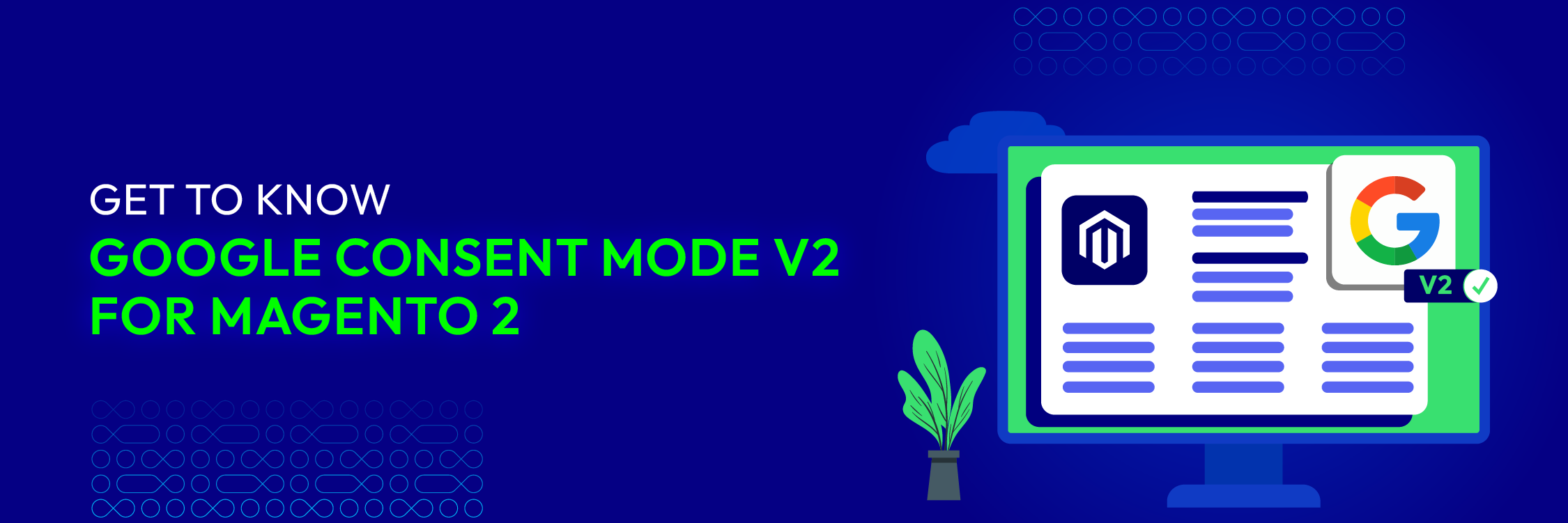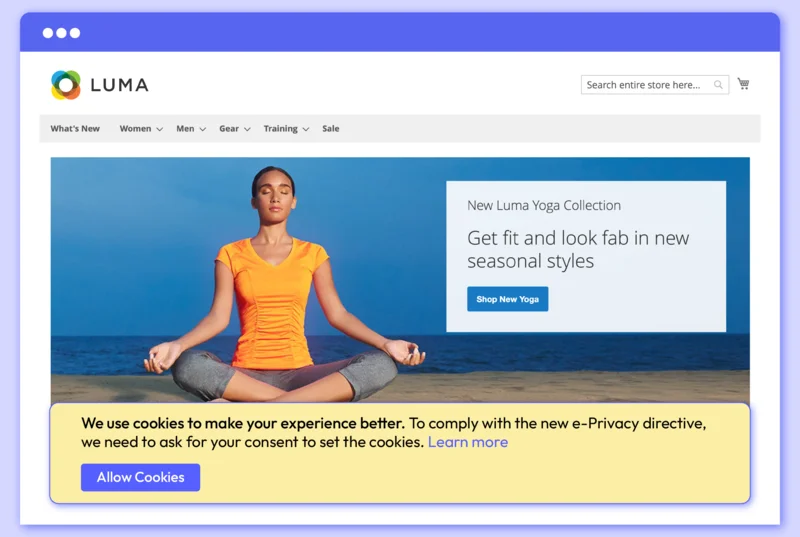Get to Know Google Consent Mode v2 for Magento 2

Google Consent Mode v2 is a crucial update introduced by Google to meet enhanced privacy regulations—especially within the European Economic Area (EEA). Starting March 2025, failing to implement Consent Mode v2 may lead to non-compliance with Google’s policies, directly affecting the functionality of key services such as Google Ads, Conversion Linker, Floodlight, and analytics tools.
For Magento merchants relying on tools like Magento 2 Google Analytics 4 extension, this update is particularly important. Without Consent Mode v2 in place, your store risks losing access to vital data from new EEA users, which could reduce the effectiveness of your analytics and advertising strategies.
The absence of Consent Mode v2 may result in:
-
Limited Data Capture: Due to the lack of Consent Mode v2, the ability to capture data from new EEA users is significantly restricted, impacting the accuracy of advertising platforms.
-
Ineffective Budget Spending: Incomplete or inaccurate data could lead to less effective spending on advertising, as bidding algorithms rely on comprehensive information.
So, what sets v2 apart? How does it differ, and what changes does it bring to your Magento store? Let’s delve into that.
Overview of Google Consent Mode v2 for Magento 2 Store
What is Google consent mode v2 in Magento store?
Google Consent Mode v2 is a big update made by Google to follow stricter privacy rules, especially in the European Economic Area (EEA). It’s a major step forward from the older version, focusing on what users need now for privacy. It sticks to tougher privacy rules and laws in online shopping, like GDPR in the EEA.
In contrast to its predecessor, this updated version mandates explicit user approval for personalized ads and analytics, introducing new consent categories such as ad_user_data and ad_personalization.
To facilitate the collection of these consents, integration with consent management solutions is employed. When users engage with a Magento store, the solution presents a cookie bar, allowing visitors to clearly grant or refuse consent. This decision then informs Google Consent Mode v2 about the usage of personal data for ads and analytics.
User consent in privacy regulations and data collection
User consent is incredibly important for data collection for several reasons:
-
Respecting user rights on privacy: Getting consent shows that businesses respect users’ privacy and give them control over their personal data. This ensures that data is only collected and used with the user’s agreement.
-
Legal compliance: Many regions have data protection laws that require user consent for data collection. For example, GDPR in the EU and CCPA in the US demand businesses to get user consent before collecting or using their data.
-
Building trust: When businesses are upfront about how they collect data and ask for user consent, it builds trust. Users are more likely to trust and engage with businesses that are transparent about their data practices.
-
Data accuracy: Consent also helps ensure the accuracy of collected data. When users willingly share information, it’s more likely to be accurate.
-
Avoiding legal trouble: Not following data protection laws can lead to hefty fines and legal issues. Getting user consent helps businesses stay compliant and avoid legal problems.
Advantages of Using Google Consent Mode v2 Magento
Using Google Consent Mode v2 for Magento 2 stores offers several advantages:
-
User Privacy: Google Consent Mode v2 prioritizes user privacy by honoring their preferences, thereby fostering trust between businesses and users. It also ensures compliance with legal standards like GDPR and CCPA, enhancing data privacy protection.
-
Enhanced Data Insights: Even when users don’t directly consent, Magento Consent Mode v2 enables businesses to derive valuable insights through conversion modeling and behavior analysis. Using AI-driven conversion modeling, it can predict the behavior of users who haven’t consented to cookie usage.
-
Improved Advertising Efficiency: Incomplete or inaccurate data can lead to less effective spending on ads, as bidding algorithms rely on comprehensive information. Google Consent Mode v2 bridges these gaps while still respecting user privacy choices, enabling businesses to make more informed advertising decisions.
Hence, Google Consent Mode v2 for Magento 2 stores achieves a delicate equilibrium between respecting user privacy and empowering businesses to gather crucial data. By offering insights into campaign effectiveness and user behavior patterns, it enables businesses to make informed choices while upholding user trust.
Best Choices of Google Consent Mode v2 for Magento 2
Mageplaza Magento 2 GDPR extension
Mageplaza Magento 2 GDPR extension is a powerful tool designed to assist e-commerce stores in complying with the EU General Data Protection Regulation (GDPR). This extension facilitates the management of customers’ personal data privacy, ensuring adherence to the strictest data privacy regulations globally.

The GDPR module from Mageplaza provides essential features to safeguard customers’ personal information effectively. It enables e-commerce businesses to handle data access and erasure requests efficiently, enhancing trust and transparency in data management practices.
Notably, our team is currently working on implementing the Google Consent Mode V2 feature, further bolstering the extension’s capabilities. Stay tuned for updates as we continue to enhance our GDPR extension for Magento 2.
Anowave’s Magento 2 Cookie Consent Mode V2
Anowave Consent extension for Magento 2 is a robust solution for managing user consent and ensuring GDPR/Cookie Law compliance. This extension supports Google Consent Mode V2 and integrates seamlessly with Google Tag Manager.
Key features:
- Supports Google Consent Mode and Consent Mode V2
- Integrates with Google Tag Manager dataLayer[]
- Fully customizable through configuration settings
- Options for color and text customization via configuration
- Optimized for PageSpeed (LCP, INP, CLS, FCP, FID metrics)
- Enables both automatic and manual cookie classification
Lumav’s Cookie Consent Module
Lumav’s Cookie Consent Module is a sophisticated solution designed to comply with Consent Mode V2. It allows websites to efficiently handle user consent for cookies and other tracking technologies, all while offering a user-friendly interface.
Key features:
- Consent Mode V2 Compliance: Manages user consent for cookies and tracking technologies.
- User-Friendly Interface: Easy for users to navigate and interact with.
- Enhanced Credibility: Ensures data is used as intended and consent requests are functional.
- Easy Configuration: Customizable settings in Magento admin per store view and language.
Plumrocket’s Magento 2 Cookie Consent Extension
Plumrocket Cookie Consent Magento 2 extension enables merchants to secure customer consent before collecting or processing any personal data. Fully compliant with GDPR, CCPA, LGPD, and other local data privacy regulations, this extension ensures adherence to stringent privacy standards.
Key features:
- Cookie Banner Display: Request customer consent with a customizable banner.
- Customizable Settings: Customers can manage specific cookie categories (marketing, preferences, statistics, etc.) and view included cookies.
- Merchant Control: Manage and block cookies, access the consent log, and customize the design.
- Google Consent Mode V2: Supports seamless integration with Google Consent Mode V2 for Magento.
Bottom Line
In compliance with legal standards, Google Consent Mode V2 ensures that your visitors’ data is managed in accordance with legal regulations and user preferences within the European Economic Area (EEA). For Magento store owners, grasping this update on data privacy is vital to upholding the performance of advertising campaigns and analytics.






